 |
10-16/7/2020 |
 |
 |
||
|
סיכום שבועי של חדשות מהיבשת ממרכז אפריקה ע״ש תמר גולן באוניברסיטת בן גוריון |
||
 |
||
 |
עורך: יבגני צ'רפ |
|
 |
||
-

סודן: איסור על מילת נשים!
סודן העבירה מספר חוקים ליברליים, בהם איסור על מילת נשים, ביטול האיסור על המרת דת מאסלאם, וביטול האיסור על לא-מוסלמים לצרוך אלכוהול, לאחר כמעט ארבעה עשורים של שלטון איסלאמיסטי קיצוני.
לפי סקר של האו"ם, כ-87% מהנשים בגילאי 15-49 בסודן היו קורבנות של מנהג המילה.
כעת, עונש מאסר של עד שלוש שנים יוטל על מי שיורשע ביצוע המעשה.
(כתבה: Kaamil Ahmed/The Guardian צילום: Ashraf Shazly/AFP via The Guardian)
לקרוא עוד >>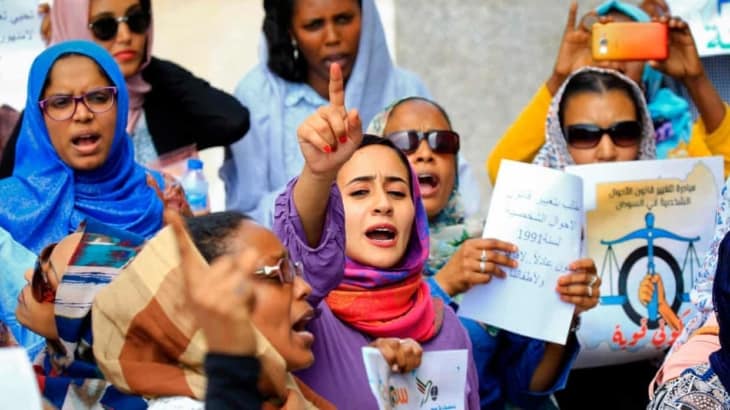
-

הרפובליקה הדמוקרטית של קונגו: גידול במספר מקרי האבולה החדשים
מארגון הבריאות העולמי (WHO) נמסר כי נגיף אבולה ממשיך להתפשט מחדש במערב הרפובליקה הדמוקרטית של קונגו (DRC), עם כמעט 50 מקרים חדשים באזור הגבול עם הרפובליקה של קונגו והרפובליקה המרכז אפריקאית מאז תחילת יוני.
(כתבה: Al Jazeera צילום: Baz Ratner/Reuters via Al Jazeera)
לקרוא עוד >>
-

אתיופיה, מצרים, סודן: כישלון השיחות על מתווה הסכר
שר המים של אתיופיה הודיע שהמאגר שמאחורי הסכר הגדול על הנילוס במדינה מתמלא.
ההודעה הגיעה יום לאחר שהשיחות עם סודן ומצרים על הפרויקט ההידרואלקטרי הענק בנילוס הכחול הסתיימו ללא הסכם.
נציגי סודן ומצרים חוששים שפרוייקט הסכר, שמוערך בעלות של 4 מיליארד דולר, עלול להוביל למחסור במים במדינותיהם.
(כתבה: Dawit Endeshaw/Reuters צילום: ©2020 Maxar Technologies via Reuters)
לקרוא עוד >>
-

זימבבואה: כיווץ גדול בכלכלה
לפי שר הכלכלה של זימבבואה, הכלכלה של המדינה צפויה להתכווץ השנה בכ-4.5%, בעקבות משבר הקורונה והבצורת שפוגעים באזור.
התחזית של שר האוצר, מתולי נקובה, אופטימית מתחזית קרן המטבע הבינלאומית, שמציגה כיווץ של למעלה מ-10%.
(כתבה: Farai Mutsaka/AP צילום: Tsvangirayi Mukwazhi/AP)
לקרוא עוד >>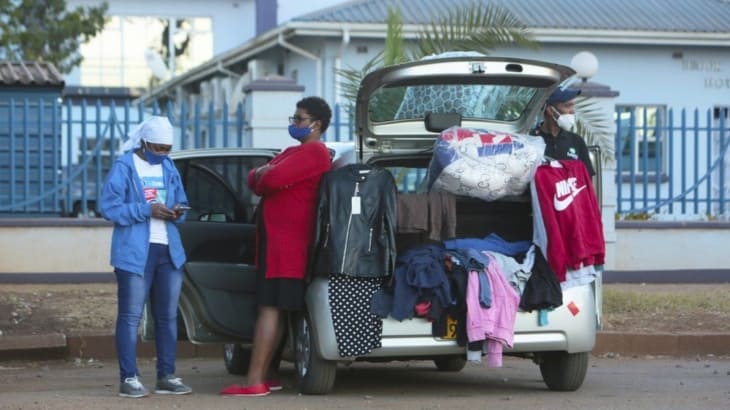
-

גבון: ראשת ממשלה ראשונה
נשיא גבון, עלי בונגו אונידימבה, מינה את רוז כריסטיאן אוסוקה רפונדה לראשת הממשלה החדשה של המדינה.
היא תחליף את ג'וליאן נקוגה בקלה, שכיהן בתפקיד מאז ינואר 2019, ותהפוך לראשת הממשלה הראשונה של גבון, לאחר שאחד עשר גברים כיהנו בתפקיד לפניה.
ב-2014, רפונדה הייתה גם האשה הראשונה שנבחרה לראשות עיריית הבירה, ליברוויל.
(כתבה: Africanews צילום: Africanews)
לקרוא עוד >>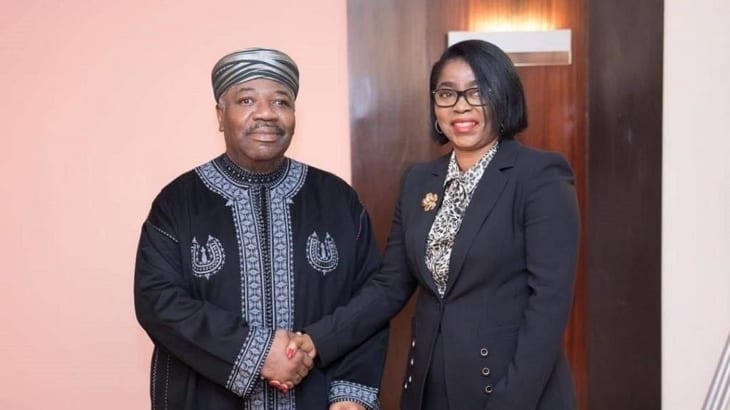
-

דרום-אפריקה: הושחת פסל של ססיל רודס
פעילים בקייפטאון, דרום-אפריקה, ערפו את ראשו של פסלו של ססיל רודס, מהסמלים הגדולים של הקולוניאליזם הבריטי.
עריפת הראש התרחשה כחלק מהמחאה העולמית שהוצתה על ידי הרצח של ג'ורג פלויד בארה"ב במאי, אך הפסל היה מטרה להשחתה מצד פעילים נגד גזענות כבר מספר פעמים בעבר.
(כתבה: The Guardian צילום: Nic Bothma/EPA via The Guardian )
לקרוא עוד >>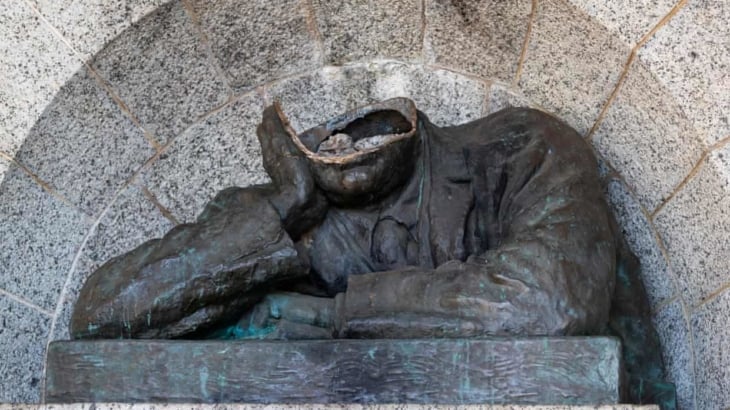
-

ניגריה: מאמר מיוחד על החוק למניעת הטרדות מיניות
The Nigerian Senate has finally passed the Sexual Harassment Bill. This seems like a win for Nigerian women. However when we look at the incidents that led up to this decision being made, it is quite evident that there is a Sexual and Gender based epidemic in Nigeria.
In the previous weeks a series of high profile cases of violence against women in Nigeria sparked a national outrage in the country. Many Nigerians took to social media to demand justice for these women. It started off with #JusticeforTina but unfortunately every week after that there was a young woman’s name next to a hashtag that was trending on Twitter. #JusticeforUwa, #JusticeforBarakat and #FreshStartforFarishina all these young women were either raped, murdered or both. These are just the names we know.
Sexual harassment cases are quite common in Nigeria, but the problem is that most of the victims don’t get justice. Some of these cases never make it to court. Some of the victims choose not to report their cases for different reasons like victim blaming, lack of trust in the judicial system and lack of trust in law enforcement as well. Between 1973 and 2019 there have only been 65 rape convictions that have been recorded in Nigeria.
On the 7th of October 2019 BBC Africa Eye released a documentary called Sex for Grades. The documentary details how female students in two prestigious universities in West Africa, University of Lagos and University of Ghana have been victims of sexual harassment and abuse from their male lecturers. The release of this documentary sparked a nationwide conversation in Nigeria about the sexual harassment that takes place in Nigerian universities. After the release of the documentary the hashtag "#Sexforgrades" became a trend on Twitter where girls and women shared their personal stories about sexual harassment.
In the documentary a former lecturer at the University of Lagos is caught on a hidden camera telling an investigative journalist posed as a 17-year-old, that another female student is getting admission into the university by “paying for it with her body”. Another student in the documentary gave details of the encounters she had with him. “He would tell you to come to his office, he would lock the door, sometimes he would want to grope you,” she said.
After the release of the documentary the University of Lagos released a press statement where they announced that the lecturer had been suspended and they had set up a panel to investigate the allegations of sexual harassment. The University also encouraged students to speak up if they had been harassed.
We decided to dive into the change that is occurring. After interviewing students and activists who are at the forefront of the struggle, we learned that there is a lot more to be done for female students in Nigeria to feel safe.
Kiki Mordi the BBC journalist behind the Sex for Grades documentary said, “There is a culture of shame, blaming victims and not seeing women as complete humans with complete body autonomy." Mordi says, "If we can just get rid of that culture as a whole, that disgusting culture it would help".
We found out that although in the public eye it looked like the University of Lagos was actively trying to make a difference behind closed doors this wasn’t the case. Not for all students at least. We spoke to some students at the university. They all chose to stay anonymous.
The university has always had a dress code that was mostly implemented on female students. A student from the university who asked to stay anonymous, told us: "The dress code was meant to make female students look “decent”. After the release of the documentary the dress code was reinforced. In some cases, lecturers would kick students out of class for wearing something that was deemed inappropriate."
The lecturer who was suspended was a senior lecturer in the Department of European Languages and Integrated Studies. The students in that department got a different treatment. A female student who does not want to be identified details how after the release of the documentary, "Some lecturers in that department made random comments about students recording them." She recalls an incident where a lecturer got upset at a student who was recording a lecture for their personal use. "The lecturer said “Oh you want to use me for an investigation, it’s against my rights for you to record me “she says. " and it didn’t stop there, some male lecturers would make unpleasant comments to students about accusing them of sexual harassment."
Another female student who also doesn’t want to be identified stated that although the school didn’t make a lot of changes. When we asked her about what the school could do to improve she said : “The school could counsel the lecturers on the dire implications of sexual harassment and sexual advances towards the students. The school should also give freshmen students an orientation session discussing the importance of consent and the grave implications of sexual assault towards women and men”. she said.
After the premiere of the Sex for Grades Documentary the Sexual Harassment Bill was reintroduced into the Nigerian Senate on the 9th of October 2019. The Bill was sponsored by Senator Ovie Omo-Agege. The bill was passed after its third reading on July 7th. The Bill will help tackle the issue of sexual harassment in Nigerian universities. It calls for administrative heads in institutions to "create an Independent Sexual Harassment Committee to deal with sexual harassment complaints on campuses". It also states that "the committee must have at least 3 women on its board”. The committee also has to protect students who file a complaint from being victimized”. Another important thing in The Bill is that it clearly explains different offenses and the consequences individuals would face if they get caught. One of the offenses states: “If an educator intimidates or creates a hostile or offensive environment for the student by soliciting for sex from the student or making sexual advances towards the student”. If a lecturer is found guilty of committing this offence, they will be sentenced to 5-14 years in prison without the option of a fine. The bill will also hold members of the Independent Sexual Harassment Committee responsible for failing to deal with a sexual harassment complaint. The Bill has been passed now but what’s next ? The Nigerian President, President Muhammadu Buhari has to sign the bill into the law.
The Bill seems like a step in the right direction however not everyone agrees with it. When the Bill was first introduced back in 2016. The President of ASUU (Academic Staff Union of Universities) stated in an interview with Punch Nigeria that the bill was "too restricted and lecturers shouldn’t be the only ones targeted when there is sexual harassment everywhere."
One of the organizations that is at the forefront fighting for women and girls in Nigeria is the STER Initiative. They advocate and engage with the community and also drive policy to end sexual violence in Nigeria. This initiative has supported over 350 rape survivors in Nigeria. They also worked on the current Sexual Harassment Bill to make sure students on university campuses are not only protected but also have an effective way to report cases.
A spokesperson for STER Initiative tells us that “The Bill will ensure that prospective and registered students can report cases of harassment and STER will have a legal framework to provide support on such cases. It also helps the initiative document the patterns of abuse, best practices and gaps, which can be used for further advocacy and program development. We’d also be able to scale this initiative across other countries.”
The STER Initiative has been successful. They’ve been able to reach more than 20,00 young people in schools, churches and local communities where they discuss the sensitization on issues of gender-based violence. However, they do continue to face challenges like inadequate laws and terrible legal processes of getting justice to survivors. The government does not have proper resources that can provide support for survivors. They also face the challenge of not having enough trained medical caregivers, legal caregivers and social workers who are specialized in managing sexual assault cases. The lack of grassroots awareness on consent and rape culture is another big challenge they face, and it has been quite evident with the series of rape and violence cases against young women that have occurred in the past few weeks.
On June 5th organizations held protests in Lagos and Abuja to ask the Federal Government to Declare a state of emergency on the Sexual and Gender based Epidemic in Nigeria. STER Initiative has started the Sexual Harassment Bill Campaign urging student bodies and organizations to pressure the Nigerian Senate into announcing a date for the third reading of Bill. This was successful because the Nigerian Senate listened and they passed the Bill.
Kiki Mordi the BBC journalist behind the Sex for Grades documentary is also a supporter of the Sexual Harassment Bill. She has continued to use her platform and her voice to advocate and spread awareness about sexual harassment in Nigeria. "I think there have been pockets of change. There is a change in the narrative. People who used to deny how bad the culture of sex for grades was are being presented with evidence. People feel a lot more emboldened to speak up. As a result of the documentary there have been terminations of a number of lecturers who weren’t even mentioned in the documentary."
Back in 2016 the Bill was introduced to the senate but unfortunately it wasn’t passed. The president of ASUU has publicly opposed the bill. What are your thoughts on this?
Mordi: "It has been quite unfortunate, and they talk about human rights of lecturers, but they have completely forgotten about the human rights of the students that are suddenly violated. They talk about the autonomy of lecturers, but they completely forget about the autonomy of women’s bodies. The problem is are we going to see these things and continue to accept them or for once are we going to start demanding accountability."
Social media has become an effective tool it has given people a platform for them to tell their stories. Nigerian women are telling the society enough is enough. They will no longer be silenced. To the male allies who have been supporting the movement or are just joining the movement there is a lot of work to be done. There are several ways you can play your part in this movement. Start by listening to women and amplifying their voices. Educate yourselves about the issue as well. The government declaring a state of emergency on rape is a step in the right direction but it’s not enough. As a society we have to come together to do the work. We need to continue to pressure our government, law enforcement and judicial system to do the right things and start holding these criminals
accountable. Change should start NOW.
(כתבה: Laro Duchi/IDC Herzliya צילום: Ukabia/Wikimedia Commons)
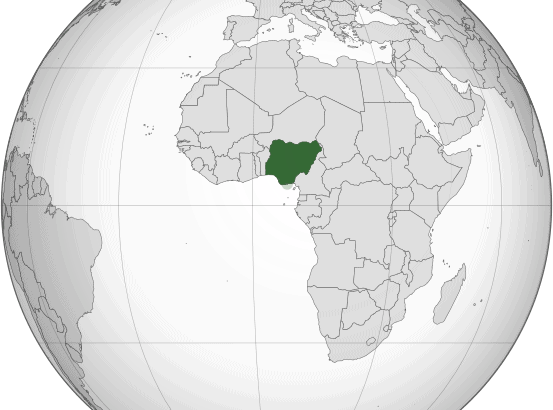
 |
SASAMASO - Fotamandry
A/C : Ra-Gé Real : Rou Project Entertainment (mars 2017)
 |
 |
 |
 |
 |